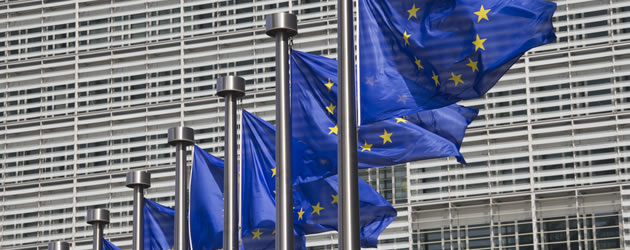- Euro surges as Eurozone economy returns to pre-crisis levels
- Pound ends recovery run after ‘Brexit’ odds dwindle
- UK consumer confidence becomes negative for first time in 15 months
- European Commission economic forecasts could create GBP/EUR volatility
Last week may have seen the Euro to Pound (GBP/EUR) exchange rate making some big losses, but the UK asset tumbled on Friday. The Euro (EUR) was strengthened on Friday after a surprise uptick in GDP marked the return to pre-crisis levels of economic activity.
Euro Ends Week Bullish as Economy Grows to Pre-Recession Levels
After ceding much ground to the Pound during the beginning of the week, the Euro was able to make a strong recovery on Friday after several positive data releases. Although German retail sales slowed further on the year and declined more on the month than predicted, Spanish GDP held onto strong levels of growth and Eurozone unemployment dipped against forecasts.
However, investors paid most attention to the Eurozone Gross Domestic Product figures for the first quarter of the year. Quarter-on-quarter (QoQ) GDP surprised on the upside, showing double the rate of growth on the previous quarter, printing at 0.6% rather than the forecast 0.4%. This level of growth means that the Eurozone economy has now returned to the levels last seen before the financial crisis.
While investors bought into the Euro, economists were urging caution. According to Moody’s Analytics’ Economist Tomas Holinka:
‘The Eurozone economy was at a better shape at the beginning of this year than expected. The quarterly growth accelerated to 0.6% in the three months to March, from 0.3% in the previous quarter.’
‘Although this preliminary number might be revised down in coming months, the growth definitely surprised on the upside. Yet weakening US and emerging market economies, the influx of migrants, and a possible U.K. exit from the EU are key risks to the region’s economy.’
Rally on Softening ‘Brexit’ Fears Ends, GBP/EUR Undone by Weak Confidence
Pound Sterling spent much of last week on the ascent, hitting a high of 1.2921 on Tuesday. The bullish performance was sparked by suggestions that fears over a ‘Brexit’ had been overly priced-in to the UK asset, making the Pound excessively weak. Correctional trading pushed GBP/EUR into a bullish rise, with as many forecasters cut the odds of a ‘Brexit’. According to Bloomberg, the chances of the UK voting to leave the European Union fell to just 21%.
Although the general perception was that the ‘Leave’ camp had been silenced by the previous week’s events, there were several developments of note which favoured the ‘Brexiters’. The most recent YouGov poll showed the ‘Leave’ campaign were in the lead by 1%, after gaining 3% of the support in recent weeks. This suggested that US President Barack Obama’s intervention in favour of the UK remaining a part of the EU hadn’t had the desired effect of driving undecided voters toward the ‘Remain’ camp.
The Leave campaign also received the backing of eight economists, collecting labelling themselves Economists for Brexit, who predicted a 4% gain in GDP if the UK was to split from the EU.
Falling consumer confidence clipped the Pound’s wings on Friday, dropping to -3, instead of -1 as predicted, after two months stagnating at 0.
Euro to Pound Sterling (EUR/GBP) Exchange Rate Forecast: Quieter Data Week could see Sentiment Drive Movement
Neither the Eurozone nor the UK is set to release any tier one data in the coming week. For the UK, Markit PMIs will generate Pound Sterling movement, especially if the manufacturing or services PMIs perform particularly well or poorly.
The Eurozone also has several PMIs due out, as well as economic forecasts from the European Commission.
EUR, GBP Conversion Rates
At the close of Friday’s London session, the Euro to Pound Sterling (EUR/GBP) exchange rate traded between 0.7763 and 0.7838, while the Pound Sterling to Euro (GBP/EUR) exchange rate was trending between 1.2749 and 1.2877.



